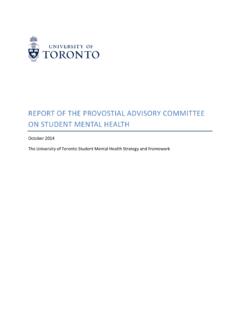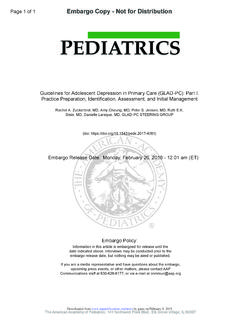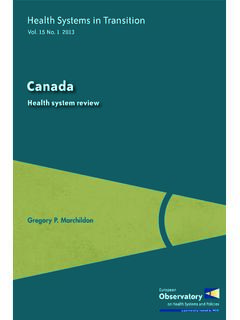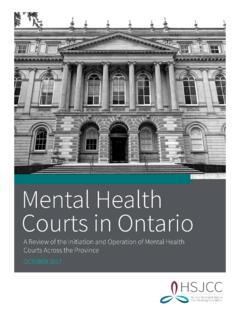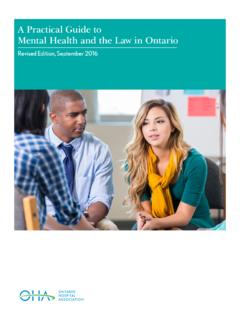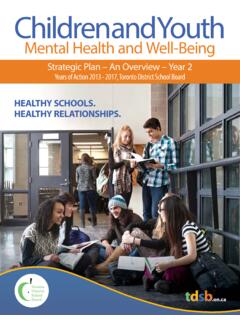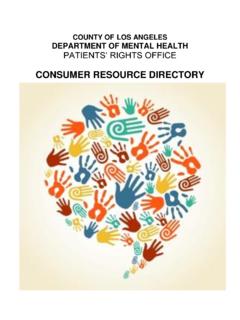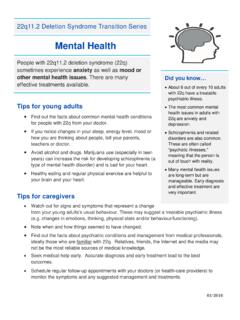Transcription of Mental Health Framework - University of Toronto
1 Mental Health FrameworkUpdate 20162 Mental Health Framework UpdateMental Health Framework UpdateSince its launch in November 2014, staff, faculty and students have been working collaboratively toward implementing the recommendations outlined in the Student Mental Health following update provides highlights of the work undertaken thus far, grouped by strategic priority, with the goal of developing a systems approach to student Mental 2016 Priority 1 Develop a communication strategy that ensures students are informed of all programs and services available, and how and when to access A web based platform called More Feet on the Ground was launched in partnership with the Council of Ontario Universities to address student Mental Health education, awareness and stigma.
2 The launch of the new website provides links to campus programs, resources and events in support of student Mental Health . The HealthyUofT site is supported via Twitter (53,000 students reached) and Facebook (130,000 views). The Flourish program at UTSC has been expanded. Developed a new website Students can take a comprehensive assessment of their Mental Health that identifies signs and symptoms of Mental Health , character strengths, academic engagement and well-being. They are provided with customized feedback and resources concerning their Mental than 2,000 UTSC students have completed the online Flourish assessment.
3 Mental Health messaging has been promoted weekly to students at the St. George campus via inclusion in the campus-wide just-in-time slide program and the 9 New Things about Mental Health supports and servicesreached approximately 60,000 students per Mental Health Framework UpdatePrint Print-based navigation pieces have been developed to demonstrate the Mental Health continuum with a range of appropriate resources based on student needs. Developed a new website Students can take a comprehensive assessment of their Mental Health that identifies signs and symptoms of Mental Health , character strengths, academic engagement and are provided with customized feedback and resources concerning their Mental Health .
4 New student-centred wayfinding signage has been installed in the Koffler Centre to direct students to the new Health & Wellness Centre location on the second HealthyUofT campaign was launched on the St. George campus Four pillars of Health and wellness were identified: Mental Health , safety, physical activity and nutrition. The pillars are marketed as HappyU, SafeU, MoveU and FuelU. Promotional materials included postcards, condoms, cutlery sets and stress balls to reflect the four pillars and were distributed to more than 10,000 students on the St. George campus. New tri-campus consent campaign was launched in September.
5 More than 30,000 bracelets, postcards and buttons were distributed across the three campuses during orientation activities. Communications materials were designed to reflect the recognize, respond and refer approach to assisting and referring students in distress and distributed to staff and faculty. More than 6,800 students were reached through Health Promotion staff/volunteers at events and workshops across the three campuses during the 2015/16 academic year. The change room project is a direct, activist and educational project that investigates locker room experiences to build awareness, compassion and conversation around equity and inclusion for lesbian, gay, bi-sexual, transgender and queer students in sport and recreation.
6 The goal of the project is to shift change room culture to be more inclusive, accepting and 20165 Priority 2 Expand strength-based programming to develop positive Mental Health and resilience that engages students early in order to prevent exacerbation of the groups The Resilience Committee (chaired by the Executive Director of Health and Wellness) has begun to address campus-wide student resiliency programming based on best available evidence. The committee has undertaken an environmental scan and literature search, culminating in a proposal for the development of a comprehensive, student-centred tool to enhance individual psychological resilience.
7 A psycho-educational group for students living with ADHD was piloted by Accessibility Services staff in the spring of 2015. Given the positive feedback from students about the value of the group and the consistent attendance of 10-12 students, ADHD groups are being offered on a permanent basis moving forward. Peers Are Here is peer support initiative of Health & Wellness and has been redesigned to align with student feedback asking for peer support that is more localized. In 2015, peer support groups were established within the Factor-Inwentash Faculty of Social Work, Faculty of Applied Science and Engineering and the department of Life Sciences in the Faculty of Arts and Science.
8 Psycho-educational groups and workshops on coping, behavioural change, balanced thinking, emotional regulation and balanced living were in the workshops rose by 26 percent and in the groups by 45 percent. Strength-Based Resilience and Habits of Happiness groups at UTSC focused on building resilience and tapping in to the strengths of students. The Health & Wellness Centre has created inter-disciplinary teams for trans Health , trauma, ADHD and eating Mental Health Framework UpdatePrograms and events Our Lives at U of T ( ) was integrated into the resiliency Framework . This initiative collates student stories of challenge, resiliency, persistence and falling forward while finding success at the University .
9 The Academic Success Centre piloted the From Intention to Action (FITA) program, beginning fall 2015, for University students who want to take a proactive approach to fostering their resilience, well-being, learning and life skills. FITA trains practicum students from social work and counselling to work over a 12-week period on developing effective academic and life management skills with students who feel overwhelmed or who may be at academic or psychological risk. The FITA program currently has 48 registered students and 278 appointments have been conducted. In February 2016, 189 students registered for the Fresh Start Conference for students wanting to bounce back from difficult academic Sessions included fostering resilience; self care and developing effective academic skills.
10 The conference was hosted collaboratively by the Faculty of Arts and Science, the Career Centre and the Academic Success Centre. The Flourish project at UTSC has engaged students through resilience-building and strength-based students at UTSC have participated in Flourish events from September 2014 August 2015. UTSC Health and Wellness centre offered Strength-based Resilience (SBR), an eight-week group for students facing Mental Health challenges. The group focused on building resilience by tapping on to the strengths of students. UTSC Health and Wellness Centre and Athletics and Recreation offered Habits of Happiness, a weekly group focused on building resilience.
